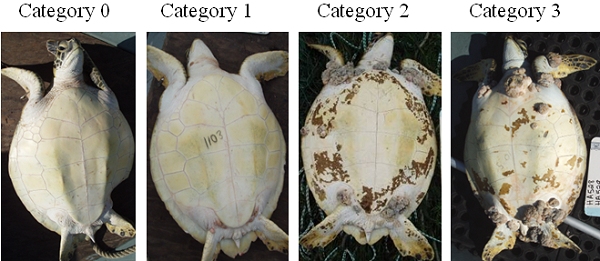Grant: 06-022R
Project Title: Stress Protein Expression as a Marker of Physiological Stress: Association with Green Turtle Fibropapillomatosis
Project Manager: Dr. Sarah Milton
Organization: Florida Atlantic University (Research and Educational Institute)
Grant Amount: $20,741.00
Completion Date: 2007-10-17
Summary: Green turtle fibropapillomatosis (GTFP) is a highly debilitating disease that affects marine turtles worldwide. This study will compare stress protein expression in red blood cells (RBCs), skin and epidermal tumors of Florida turtles from GTFP-prevalent sites with more pristine, GTFP-free sites. Heat shock proteins (HSPs, stress proteins) are highly conserved constitutive and inducible proteins that are upregulated by a variety of stressors. A previous study done in my lab has shown that levels of expression of HSP72 are significantly higher in healthy turtles from a GTFP-prevalent site compared to healthy turtles from a GTFP-free site, suggesting that these turtles have increased general stress loads. HSP72 expression was significantly higher in the nucleated RBCs than in skin tissues of turtles from both sites, providing a minimally-invasive way to measure relative integrated stress loads in sea turtles; the debilitating effects of physiological stress are likely to be a factor in the potentially multifactorial etiology of GTFP. As the initial study also showed that two stress proteins (HSP72 and GP96) were detectable in tumors of diseased turtles, this provides a potential future avenue for the treatment of GTFP. This study will expand upon these findings to establish the use of HSPs as a Tier I biomarker in sea turtles by comparing additional GTFP-prevalent and pristine sites in Florida, by examining HSP levels in multiple species, and by the investigation of HSP expression in heavily tumored turtles. Blood, tumor, and skin samples obtained from cooperating researchers around the state and in Hawaii (to expand our investigation of heavily tumored animals) will be analyzed in our lab by standard molecular techniques (Western blot analysis) to determined relative levels of stress protein expression in the tissues.  Results: Fibropapillamatosis (FP) is a herpes-associated, neoplastic disease that induces cutaneous tumors found most commonly on soft tissue of marine turtles. Prevalence of this disease is highest among juvenile turtles in near-shore ecosystems, particularly in bays and estuaries that have been impacted by agricultural, urban, and industrial development. An up-regulation in HSP72 and GRP96 was found in tumor biopsies compared to healthy skin samples, which increased with increasing tumor severity. The data indicate that animals in the IRL are under more physiological stress than those of the TSB, and that increased tumor burdens are associated with an elevated intracellular response. Preliminary results indicate the highest concentrations of HSP72 and GRP96 are found in cauliflower-like tumors, a lower expression in smooth tumors, and little expression of GRP96 in healthy skin biopsies. As the ratio of pro-survival and pro-apoptotic (cell suicide) proteins is also altered in mammalian tumors, we examined the levels of Bcl-2 and Bax. An up-regulation of the anti-apoptotic Bcl-2 has been implicated in a number of cancers, and contributes to uncontrolled growth and immortality in tumor cells. Preliminary results indicate an up-regulation of Bcl-2 in tumor biopsies vs. healthy skin. As elevated HSP72 is also associated with cell survival, the up-regulation of both HSP72 and Bcl-2 implies that growth at the molecular level in FP tumors resembles mammalian systems, and opens potential avenues for future treatment, as both Bcl-2 and heat shock proteins are targets of investigation in human cancer treatment. (Authors: Alissa Deming & Dr. Sarah Milton)
Results: Fibropapillamatosis (FP) is a herpes-associated, neoplastic disease that induces cutaneous tumors found most commonly on soft tissue of marine turtles. Prevalence of this disease is highest among juvenile turtles in near-shore ecosystems, particularly in bays and estuaries that have been impacted by agricultural, urban, and industrial development. An up-regulation in HSP72 and GRP96 was found in tumor biopsies compared to healthy skin samples, which increased with increasing tumor severity. The data indicate that animals in the IRL are under more physiological stress than those of the TSB, and that increased tumor burdens are associated with an elevated intracellular response. Preliminary results indicate the highest concentrations of HSP72 and GRP96 are found in cauliflower-like tumors, a lower expression in smooth tumors, and little expression of GRP96 in healthy skin biopsies. As the ratio of pro-survival and pro-apoptotic (cell suicide) proteins is also altered in mammalian tumors, we examined the levels of Bcl-2 and Bax. An up-regulation of the anti-apoptotic Bcl-2 has been implicated in a number of cancers, and contributes to uncontrolled growth and immortality in tumor cells. Preliminary results indicate an up-regulation of Bcl-2 in tumor biopsies vs. healthy skin. As elevated HSP72 is also associated with cell survival, the up-regulation of both HSP72 and Bcl-2 implies that growth at the molecular level in FP tumors resembles mammalian systems, and opens potential avenues for future treatment, as both Bcl-2 and heat shock proteins are targets of investigation in human cancer treatment. (Authors: Alissa Deming & Dr. Sarah Milton)